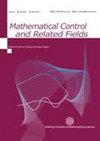具有无限记忆和延迟的抽象热弹性系统的一般稳定性
IF 0.9
4区 数学
Q1 MATHEMATICS
引用次数: 2
摘要
本文研究了Hilbert空间中具有无限记忆和时滞的抽象热弹性系统。在一些合适的条件下,利用半群理论证明了该方法的适定性。由于阻尼可以使系统稳定,而时滞可以使系统失稳,因此讨论了阻尼与时滞项的相互作用,得到了当阻尼的作用大于时滞的作用时系统是均匀稳定的。通过建立与系统能量等效的合适的Lyapunov泛函,我们还建立了抽象热弹性系统的一般能量衰减结果。本文章由计算机程序翻译,如有差异,请以英文原文为准。
General stability of abstract thermoelastic system with infinite memory and delay
In this paper we study an abstract thermoelastic system in Hilbert space with infinite memory and time delay. Under some suitable conditions, we prove the well-posedness by invoking semigroup theory. Since the damping may stabilize the system while the delay may destabilize it, we discuss the interaction between the damping and the delay term, and obtain that the system is uniformly stable when the effect of damping is greater than that of time delay. By establishing suitable Lyapunov functionals which are equivalent to the energy of system we also establish the general energy decay results for abstract thermoelastic system.
求助全文
通过发布文献求助,成功后即可免费获取论文全文。
去求助
来源期刊

Mathematical Control and Related Fields
MATHEMATICS, APPLIED-MATHEMATICS
CiteScore
2.50
自引率
8.30%
发文量
67
期刊介绍:
MCRF aims to publish original research as well as expository papers on mathematical control theory and related fields. The goal is to provide a complete and reliable source of mathematical methods and results in this field. The journal will also accept papers from some related fields such as differential equations, functional analysis, probability theory and stochastic analysis, inverse problems, optimization, numerical computation, mathematical finance, information theory, game theory, system theory, etc., provided that they have some intrinsic connections with control theory.
 求助内容:
求助内容: 应助结果提醒方式:
应助结果提醒方式:


